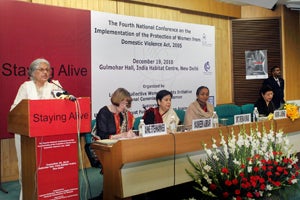From Campaigning to Monitoring: Making Domestic Violence Laws Meaningful to Women in India
Date:
New Delhi - In 2005, the Lawyers Collective Women’s Rights Initiative (LCWRI) spearheaded a successful national campaign to enact the Protection of Women from Domestic Violence Act (PWDVA). Prior to this, there was neither a clear legal definition of domestic violence nor any law in India that specifically addressed this crime. Since then, with support from the UN Trust Fund to End Violence against Women, LCWRI has worked to ensure that the passed Law makes a real difference in the lives of women, tracking its enforcement through the “Stay Alive” annual Monitoring and Evaluation Reports.

The newly-launched documentary “From Campaigning to Monitoring“, produced by LCWRI, celebrates achievements to date and suggests an activist route towards full implementation of the Domestic Violence Act. Ms. Indira Jaising, Additional Solicitor General, Director of LCWRI and CEDAW Committee member from India, speaks about the new documentary and the Domestic Violence Act and on how to ensure that laws are meaningful to women.
What is the key message you want to send through this documentary?
The documentary portrays the long and challenging journey of Lawyers Collective and other women’s rights organizations in coalition-building, consultative process and engagement with other stakeholders while drafting and implementing the law. It further highlights the need for Governments to institutionalize the monitoring and evaluation of laws relating to women, for coordinated and integrated policy responses.
On the whole, the key message is that, besides addressing gaps and challenges in implementation of the Domestic Violence Law, the real need is to break away from the patriarchal mindset and to equalize power relations within the home.
The passage of the Domestic Violence Act in 2005 was a key milestone for women’s struggle to end violence against women in India. What have been the key lessons learned from that process?
The process leading up to this law heralded a new era of law-making in which the demand for a law is articulated by civil society and the content of the law is arrived at through a consultative process aimed at consensus-building. This successful experiment has demonstrated that the process of law-making is no longer the sole preserve of the State, but must include participation from civil society.
What have been the real changes in women’s lives as a result of the law?
The passing of the domestic violence law has reinforced the norm that violence against women is unacceptable and, more importantly, this norm has been backed by State sanctions. Since the inception of the law, Lawyers Collective has taken the initiative to monitor the implementation of the Act, noting that over the years the number of cases reported has increased steadily, denoting increased awareness amongst women. As further observed in the Monitoring & Evaluation Reports we recently published with support from the UN Trust Fund, the promise of fast relief is the major attraction of this law for women.
Overall, from your experience in India, what do women expect from a Domestic Violence Law, and how could laws better respond to the real needs of female survivors of domestic violence?
Access to justice is one of the foremost issues for women, as it often translates into consistent improvement in services available to them. Also, the right to residence is important although routinely denied to women if the property in question belongs to the in-laws. Nevertheless, we have noted an increase in the number of cases settled through counselling. Women should not be forced to undergo counselling if they have mentioned that they do not want it. Thus, there is need for protocols for effective implementation of the law in order to provide holistic guidance to all stakeholders.
Looking ahead, what would be, in your opinion, the most important and urgent achievement in the efforts to end domestic violence in India?
In our opinion, a significant achievement in the efforts to end violence against women in India would be ensuring that women have effective access to justice to enable them to obtain remedies as envisaged under the Act. There is a need to address the gender bias in the administration of justice, along with structural and procedural barriers such as high costs, lack of effective/qualified legal representation or legal aid services, lack of awareness or information, judicial bias, hostility while accessing the justice system and lack of enforcement – all of which prevent women from seeking relief that protects them from violence.
The State should set up mechanisms for monitoring and evaluating existing laws, programmes and policies for women so as to ascertain how the law is functioning and take corrective measures as soon as the need arises. It is crucial that the State also takes special measures to put in place zero-tolerance policies on domestic violence, thereby ensuring that there is no impunity for perpetrators of violence. Furthermore, the State needs to introduce and enforce substantive equality standards in all spheres, particularly with regard to equal entitlements within the family as this will go a long way in reducing vulnerability to violence. Finally, there is a need to implement the existing legislation properly and to ensure government accountability for the implementation of laws dealing with women.